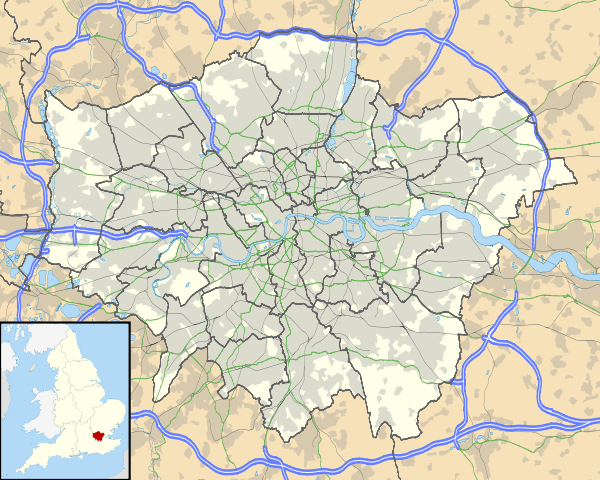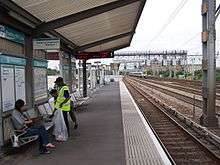Pudding Mill Lane DLR station
| Pudding Mill Lane | |
|---|---|
|
New station, opened in April 2014 | |
 Pudding Mill Lane Location of Pudding Mill Lane in Greater London | |
| Location | Queen Elizabeth Olympic Park |
| Local authority | Newham |
| Managed by | Docklands Light Railway |
| Number of platforms | 2 |
| Accessible | Yes [1] |
| Fare zone | 2 and 3 |
| DLR annual boardings and alightings | |
| 2012 |
|
| 2013 |
|
| 2014 |
|
| 2015 |
|
| Key dates | |
| 15 January 1996 | Opened |
| 18 April 2014 | Original station closed permanently |
| 28 April 2014 | Re-sited station opened |
| Other information | |
| Lists of stations | |
| WGS84 | 51°32′03″N 0°00′50″W / 51.5341°N 0.0138°WCoordinates: 51°32′03″N 0°00′50″W / 51.5341°N 0.0138°W |
|
| |
Pudding Mill Lane is a station on the Docklands Light Railway (DLR) in directly next to the Stratford district of the Queen Elizabeth Olympic Park in the London Borough of Newham, Greater London. It opened in 1996 on the road of the same name, in a light industrial area. It is next to the Olympic Park; however, it was closed for the duration of the 2012 Olympic Games and reopened on 12 September 2012. The original island platform station was permanently closed on 18 April 2014 in order to allow for the construction of a ramp from the new Crossrail portal nearby. A new, larger station built a short distance to the south opened on 28 April 2014.[4]
The station is located on the DLR's Stratford branch, between the Bow Church and Stratford stations and is on the boundary between Travelcard Zone 2 and Zone 3.
History
Original station

The plans for the DLR to Stratford included an option for a station at Pudding Mill Lane. Funding was not available to build the station, but the location was one of two places safeguarded for future development, the other being Langdon Park.[5]
Pudding Mill Lane was opened on 15 January 1996. Previously this location had been a simple passing point for trains on the otherwise single-tracked section between Stratford and Bow Church.
The name of the station is taken from the nearby Pudding Mill Lane which, in turn, takes its name from the former Pudding Mill River, a minor tributary of the River Lea. This is believed to have taken its name from St. Thomas's Mill, a local water mill shaped like a pudding and commonly known as Pudding Mill.[6] The area had also been called Knob Hill up until the 1890s.[7]
When all the other platforms on the DLR's Stratford branch were extended to accommodate three-car trains, Pudding Mill Lane remained with a two-car platform, instead using selective door operation.[8] The lack of platform extensions in this case was due to the pending rebuild of the station.
During the 2012 Olympic Games, Pudding Mill Lane station was temporarily closed for safety reasons as, while ideally situated to serve the Olympic site, it was far too small to cope with the probable passenger numbers.[9]
The original station closed after the final service of 17 April 2014[10] (actually at 00:47 18 April) and the replacement opened on 28 April.[11]
New station
Crossrail, due to open through the area in May 2019, has a tunnel portal to the east of the original Pudding Mill Lane site. The ramp from the portal to track level at Stratford station will pass directly through the original Pudding Mill lane station site, thus requiring a replacement station to be built on a new viaduct nearby.[12] The original station was demolished to make way for the new ramp, funded as part of the Crossrail project.[13] This work also permitted the upgrade of the only significant stretch of single track left on the DLR to be doubled.[14]
In July 2011, Newham Council's Strategic Development Committee approved plans by architect Weston Williamson for the new station. Sited just to the south of the old station, between the River Lea and City Mill River, it was built with a higher capacity to cope for new developments in the area. It has three-car platforms, better pedestrian links and access to buses, improved step-free access, and provision for escalators.[13][15][16]
References
- ↑ "Step free Tube Guide" (PDF). Transport for London. Archived (PDF) from the original on 3 June 2015.
- ↑ Transport for London (12 February 2013). "Freedom of Information DLR usage 1213". Transport for London. Retrieved 10 November 2013.
- 1 2 3 "Up-to-date DLR entry/exit statistics for each station" (XLSX). What Do They Know. Transport for London. 18 March 2016. Retrieved 2 April 2016.
- ↑ Mansfield, Ian (2014-04-16). "Last chance to use Pudding Mill Lane DLR station before it closes". IanVisits. Retrieved 2014-04-18.
- ↑ The DLR Story, London Docklands Development Corporation.
- ↑ British History Online: Ancient Mills.
- ↑ Hidden London: Pudding Mill Lane.
- ↑ "Docklands Light Railway, a success story that spans a generation". Rail.co. 1 February 2011.
- ↑ "DLR and the Olympics". Transport for London. n.d. Retrieved 11 March 2012.
- ↑ "Work gears up to deliver a bigger and better Pudding Mill Lane station after Easter". Transport for London. 15 April 2014. Retrieved 20 April 2015.
- ↑ "New DLR station opens at Pudding Mill Lane". Transport for London. 28 April 2014. Retrieved 20 April 2015.
- ↑ Pudding Mill Lane Portal. Crossrail.
- 1 2 "Replacement DLR station at Pudding Mill Lane approved". European Railway Review. 25 July 2011.
- ↑ Broadbent, Giles (4 May 2011). "DLR sizes up network expansion". The Wharf. London.
- ↑ Morgan Sindall site briefing on 29-08-13
- ↑ "Crossrail issues contract notice for final tunnel portal". Rail. Peterborough. 10 August 2011. p. 17.
External links
| Wikimedia Commons has media related to Pudding Mill Lane DLR station. |
- Docklands Light Railway website - Pudding Mill Lane station page
- Weston Williamson Architects website - Proposed replacement for Pudding Mill Lane DLR station
| Preceding station | Following station | |||
|---|---|---|---|---|
towards Lewisham | Docklands Light Railway | Terminus |